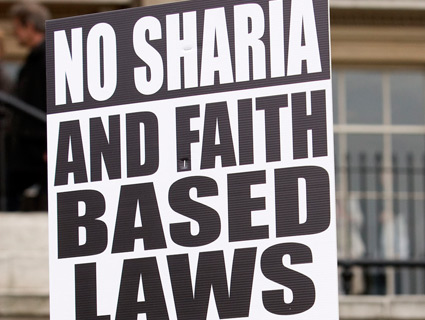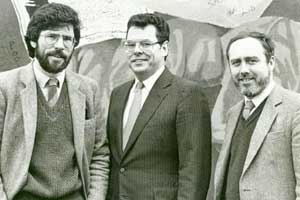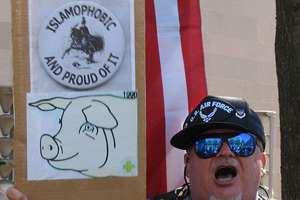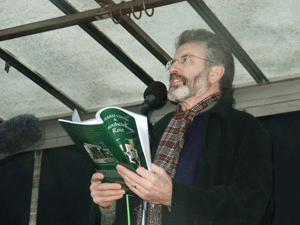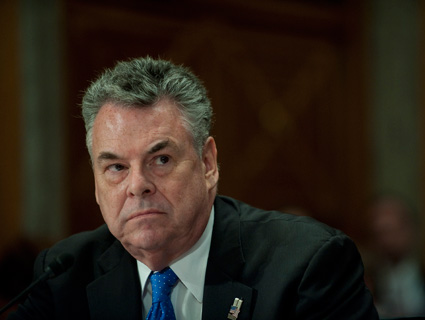
Pete Marovich/Zuma
On Thursday, Rep. Peter King (R-N.Y.), the chairman of the House Committee on Homeland Security, will hold hearings on what he calls the “radicalization” of members of the American Muslim community. King, who has previously called for the New York Times to be tried for treason and for WikiLeaks to be listed as a terrorist organization, has never shied away from confronting terrorist threats wherever he sees them—but this time he’s struck a nerve. He’s been denounced by the ACLU and Democratic rivals—who have compared him to Joseph McCarthy. His own party, meanwhile, has been conspicuously silent. So who’s going to speak on Thursday? And what are they going to say? We’ve got you covered:
When: Thursday at 9:30 A.M. You can watch it live on C-Span, catch the webcast here, and follow my Twitter feed for live updates.
What’s the back story? When King announced the hearings last December, he explained that law enforcement officials “are constantly telling me how little cooperation they get from Muslim leaders.” King concedes that only a small fraction of American Muslims have ties to terrorism, but argues that those extremists have outsized influence, citing one figure that 80-percent of mosques in the United States are under the control of jihadists (that figure has been debunked). King believes “political correctness” is interfering with national security; as he explains it, the hearings are analogous to investigations into the Italian-American mafia.
Is there anything to that? Attorney General Eric Holder, the nation’s top law enforcement officer, has said the threat of homegrown terrorism “keeps me up at night,” citing, among others, Yemeni-American cleric Anwar al-Awlaki. In a speech last weekend, Deputy National Security Adviser Denis McDonough called combatting radicalization at home “part of our larger strategy to decisively defeat Al Qaeda.” Other American citizens who have been charged with planning or commmitting acts of terrorism include Maj. Nidal Hasan, the Fort Hood shooter, and failed Time Square bomber Faisal Shahzad. Law enforcement officials say Latino converts to Islam are increasingly vulnerable to radicalization.
But. But, critics of the hearings dispute King’s central premise—that American Muslims are complicit in the radicalization of a tiny minority. A February study by the Triangle Center on Terrorism and Homeland Security, for instance, reported that Muslim-American terrorist attacks had dropped significantly in the last year, and that 40-percent of all terrorism arrests came after a tip from the Muslim-American community.
Who will be there? King’s committee has called seven witnesses: Los Angeles County sheriff Lee Baca, Dr. M. Zuhdi Jasser, Melvin Bledsoe, Abdirizak Bihi, Rep. Keith Ellison (D-Minn.), Rep. Frank Wolf (R-Va.), and Rep. John Dingell (D-Mich.). Here’s what you need to know:
- Baca: Baca’s been an outspoken critic of King’s hearings; last month he told a Muslim-American group “I don’t know what Mr. King is hearing or who he’s hearing it from.” At a similar hearing in 2010, Baca got into a heated dispute with then-Indiana Rep. Mark Souder, a Republican, over the Muslim’s community’s cooperation in counter-terrorism investigations. Souder had criticized Baca for his association with CAIR, which he argued was a terrorist front group (more on that later). One subject that probably won’t come up and has nothing to do with anyone: Baca was investigated by the city for his role in the Mel Gibson drunk-driving arrest, for which he was suspected of giving the star preferential treatment.
- Jasser: An Arizona doctor, military vet, and most notably, Fox News’ favorite Muslim commentator. The founder and president of the American Islamic Forum for Democracy, he’s been praised by ultra-conservative activists like Frank Gaffney, and been a guest on Glenn Beck (who calls him “a voice that I trust.”) His film, The Third Jihad, was a source for the debunked 80-percent figure cited by King. Sarah Posner at The Nation has the best take on Jasser, arguing that his inclusion is “part of a strategy to deflect widespread criticism that King’s hearings are an attempt smear all Muslims with a broad brush.”
- Bihi: Bihi, the uncle of a Minneapolis teen who was found murdered in Somalia after being recruited by the terrorist organization Al-Shabbab, has publicly sparred with Ellison over the question of radicalization. He’s the director of the Minneapolis-based Somali Education and Social Advocacy Center, and, along with Jasser, the witness most likely to tell King what he wants to hear. Bihi criticized the Twin Cities’ Somali community for obstructing investigations into Islamic extremism and suggested that the Justice Department’s investigation into the disappearance of Somali-American teens was poorly handled—an argument that puts him at odds with the FBI. Read the Star-Tribune for the back story on that case, which is likely to form the basis of Bihi’s testimony.
- Bledsoe: The father of Abdulhakim Mujahid Muhammad (formerly Carlos Bledsoe), a Muslim convert who attacked an Arkansas recruiting center in 2009. Like Bihi, Bledsoe has first-hand experience with radicalization, but there’s a catch: He’s publicly stated that his son’s transformation, the details of which aren’t entirely clear, took place during his time abroad in Yemen; Muhammad’s own statements support that. In other words, he was radicalized abroad, not at home (the Arkansas prosecutor also believes Muhammad acted alone and not at the behest of Al Qaeda). Like Bihi, Melvin Bledsoe has criticized the FBI, telling the Times that the feds didn’t do enough to prevent his son’s descent: “If it can happen to my son, it can happen to anyone’s son.”
- Ellison: Since being elected as the first Muslim member of Congress in 2006, he’s become a leader within the nation’s Muslim community. In recent interviews, Ellison has explained that while he rejects the premise of the hearings—calling them “McCarthyistic“—he believes engagement is a better course of action than ignoring them altogether.
- Wolf: To date, Wolf’s most vociferous warnings about domestic terrorism have focused on money. In 2008, he wrote a letter to Georgetown University expressing his concern that the school’s foreign service program had come under the undue influence of the Saudi government. He’s also criticized the Council on American-Islamic Relations, which he believes is sympathetic to terrorist organizations; as proof, he cites a 2007 episode, in which CAIR was named as an “unindicted co-conspirator” in a material support for terrorism case involving Hamas.
- Dingell: The veteran Michigan congressman represents the city of Dearborn, the heart of Michigan’s large Arab-American population. Last summer, Nevada Senate candidate Sharron Angle warned that Dearborn was already under Sharia law, a claim that was parroted by (among others) Fox News’ Brian Kilmeade. In a letter to King co-authored with Rep. Pete Stark (D-Cal.), Dingell told the chair he was “deeply troubled” by the scope of the hearings.
Who Won’t Be There: Despite King’s insistence that Muslim community has been uncooperative on terrorism, the only law enforcement official he’s called to testify, Baca, has directly refuted that premise. And while Muslim community leaders have been a focal point of King’s criticism, just one of the witnesses, Bihi, seems likely to support his claims. King has been fiercely criticzed by far-right activists, meanwhile, for excluding self-styled anti-terror experts like Frank Gaffney, Robert Spencer, and Steve Emerson, who believe groups like CAIR are covertly working to undermine the United States. King had originally announced that Walid Phares, a counter-terrorism scholar and a Lebanese Christian, would testify, but rescinded the invitation because he thought it would distract from the focus on Muslims.
Does King’s past matter? The Long Island congressman, who once called himself the “Ollie North of Ireland” because of his prolific fundraising for the Irish Republican Army, insists that his own past radicalism isn’t relevant to the current proceedings. As we’ve reported, his activities in the 1980s on behalf of the IRA would probably constitute material support for terrorism under today’s laws, even though Irish Republicans never directly targeted Americans. If his witnesses move beyond domestic terrorism to larger questions of material support for groups like Hamas—the central criticism of CAIR—his own double-standard could become an issue.
Beyond King: The chairman understandably gets most of the attention, but the committee member most likely to show up in a Daily Show clip reel is probably Georgia Rep. Paul Broun, a GOPer who has previously warned that President Obama would impose a fascist dictatorship on the country. In 2009, Broun, along with three other GOP congressmen, suggested that members of CAIR had infiltrated Congress by posing as interns, and demanded that the House Sergeant of Arms investigate (he didn’t). Rep. Dan Lungren (R-Calif.) has also used CAIR as a bogeyman in the past—most recently, in his 2010 campaign against Democrat Ami Bera. Lungren targeted Bera for receiving a $250 donation from the director of the group’s Sacramento chapter, noting the previous terror ties of two ex-members.

